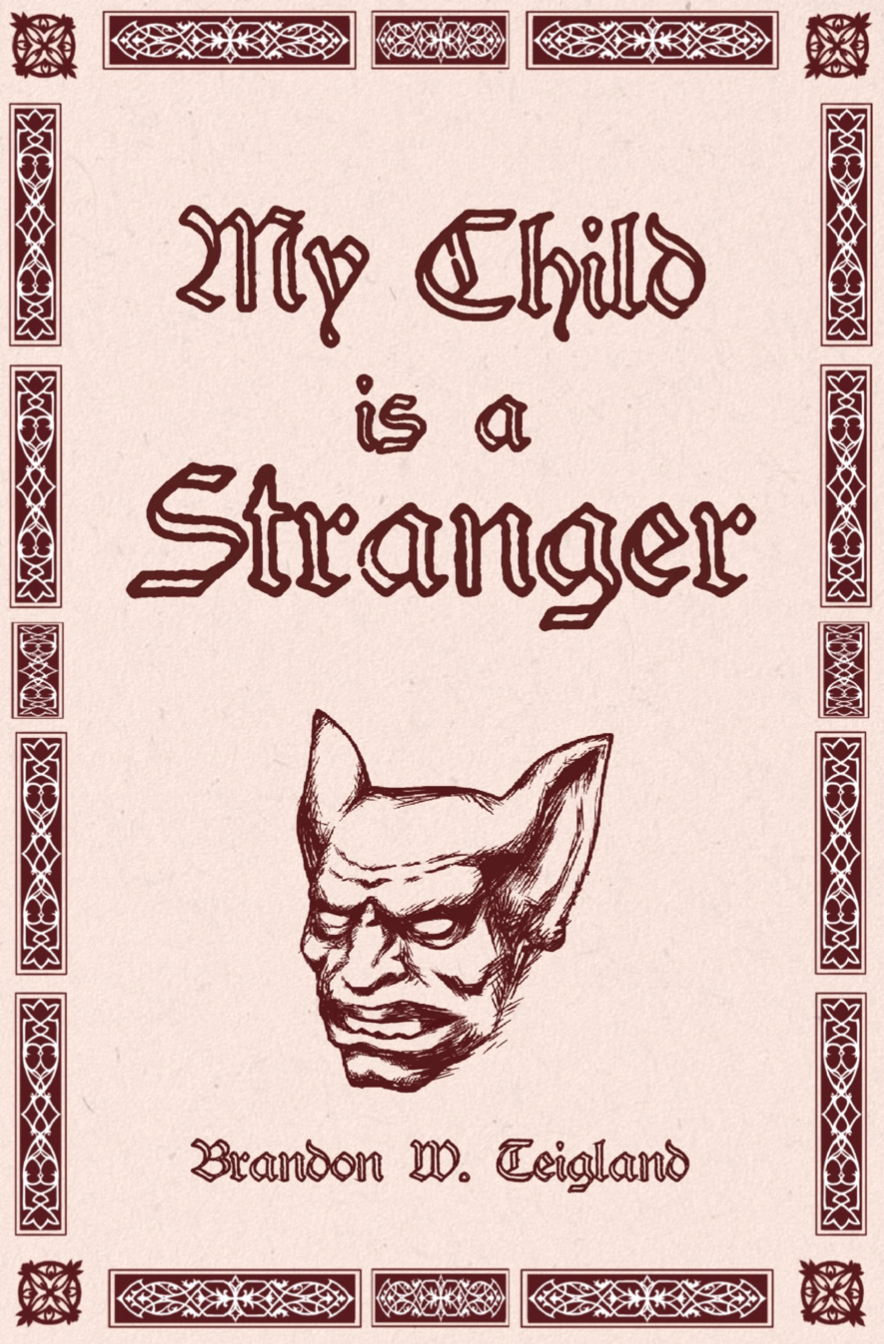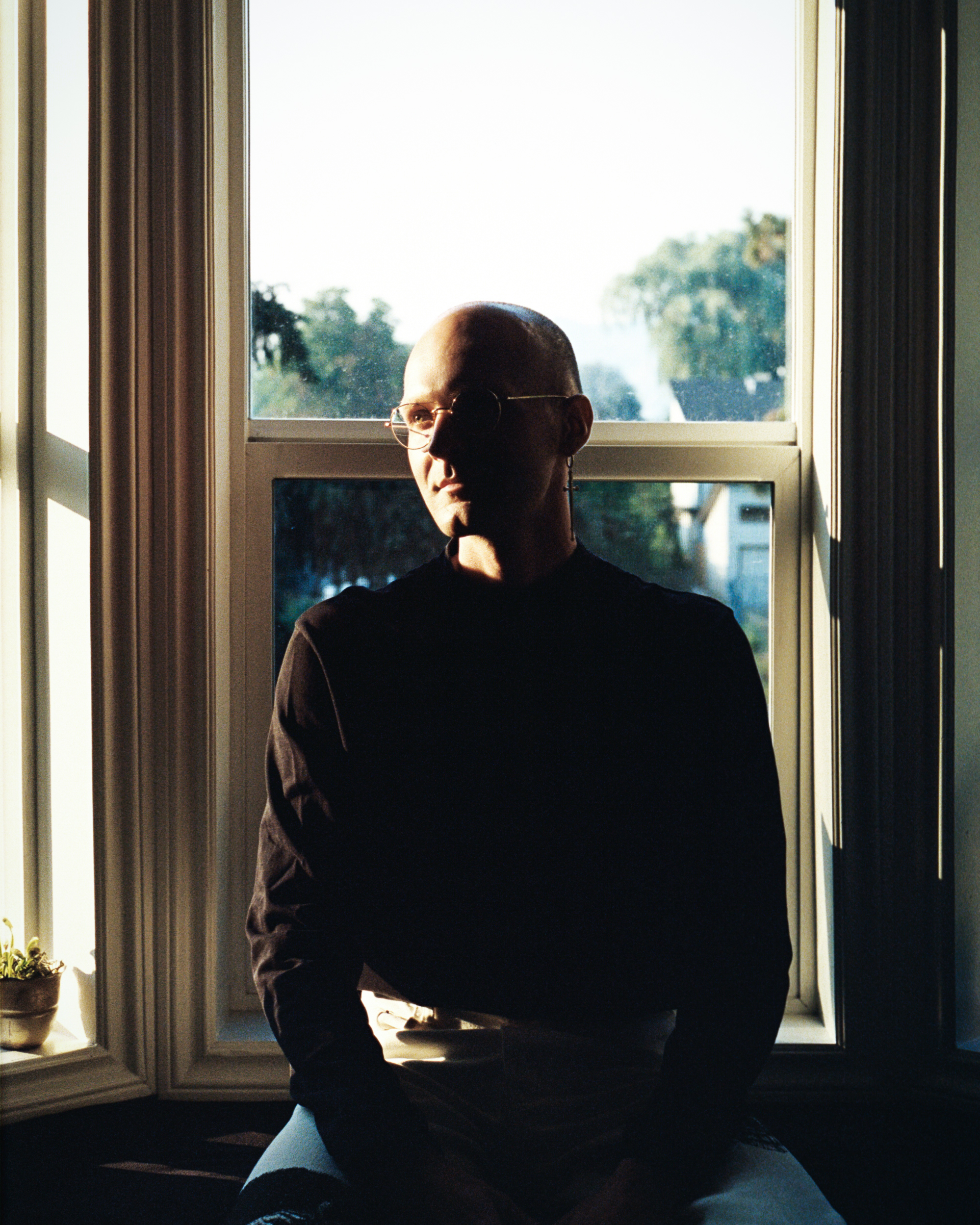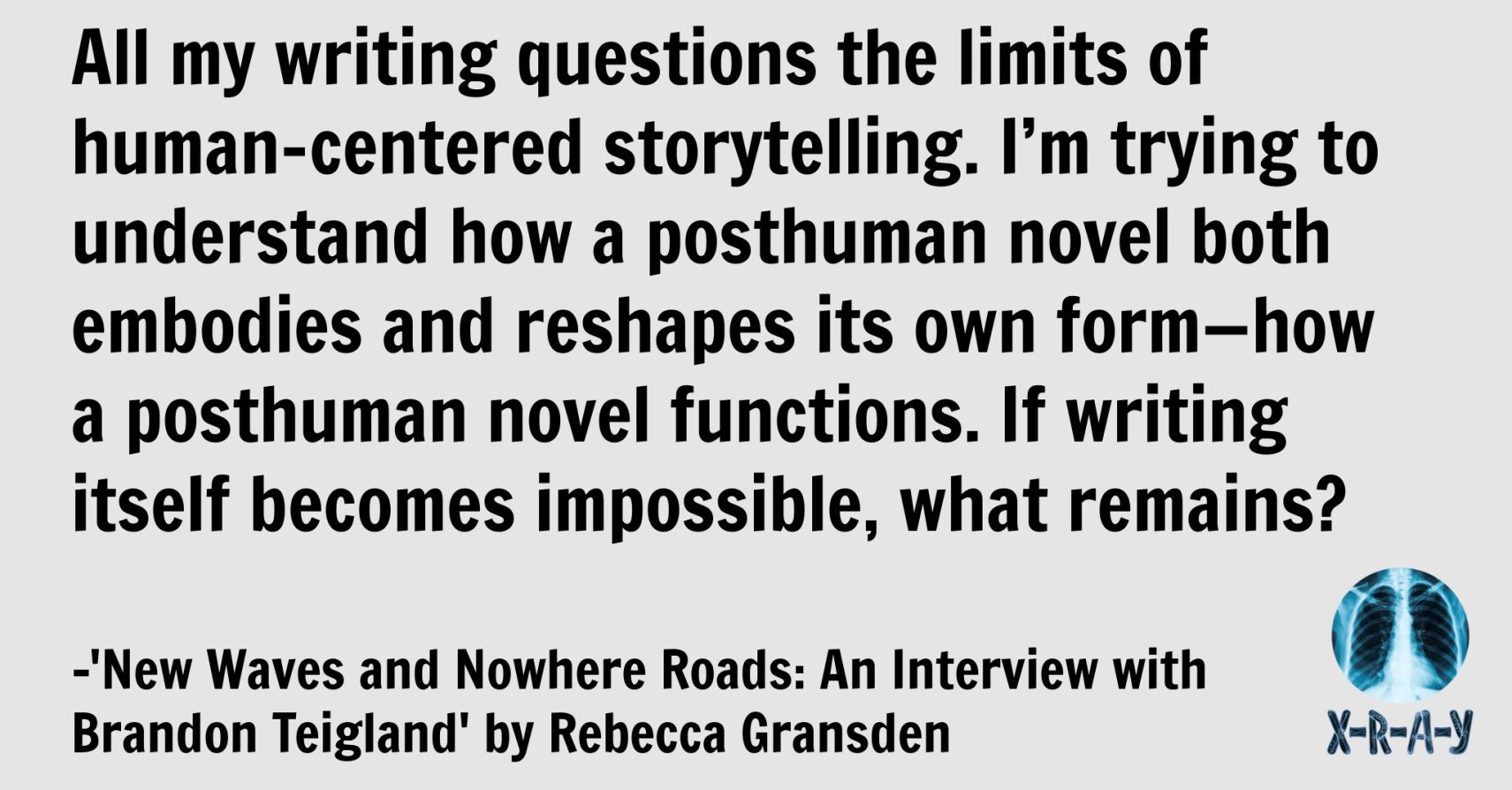
With the short fiction collection My Child is a Stranger (AOS, 2025) Brandon Teigland offers a close reading of possible futures. Teigland’s exploratory voracity lays the groundwork for an examination of impulse, whether towards the limits of art or the human. The realm of theory has to live in our very real, fleshy heads, at least for now, but what happens when assumptions break down? I spoke to Brandon about this questing and interrogative collection.
Rebecca Gransden: How long has the compilation of My Child is a Stranger taken you? What was the process of choosing the stories for inclusion like?
Brandon Teigland: Over the past decade, while writing and publishing three other books, I was also assembling this collection—eighteen stories written between 2015 and 2025. In that time, the culture of contemporary fiction has changed. All the stories I’ve included in My Child is a Stranger are in some way about the time of their writing, whether they explicitly address the issues of the day or not. Everyone knows what these are: globalization, economic collapse, inequality, technological upheaval, environmental degradation, mass displacement, terror, war, and, with these, shifting ideas of what it means to be human.
Is there a common thread among these? Probably not. As Jean-François Lyotard would say, there is no overarching metanarrative to explain and justify everything. There are only outcomes—ideas lived out in all their messy complexity.
The ‘child’ in the title comes from Emmanuel Levinas’s Totality and Infinity, where he cites Isaiah 49: My child is a stranger, but a stranger who is not only mine, for he is me. He is me, a stranger to myself… However we relate to children in our own lives, the figure of the child—whether as an evasion or an embodiment of hope and despair—tells us something of the fears we as a species have for the future and what hope we invest in it.
RG: What does the posthuman mean to you, and how does it manifest in your writing?
 BT: Posthumanism is a strange institution—one that allows us to be everything, anything. David Roden’s Disconnection Thesis suggests that posthumans would be radically different from humans because they would be ‘disconnected’ from existing human forms of life, practices, and conceptual frameworks. This disconnection isn’t just physical but involves a deeper ontological rupture—meaning posthuman beings may not be understandable in human terms, as they would operate outside the assemblage of human social systems.
BT: Posthumanism is a strange institution—one that allows us to be everything, anything. David Roden’s Disconnection Thesis suggests that posthumans would be radically different from humans because they would be ‘disconnected’ from existing human forms of life, practices, and conceptual frameworks. This disconnection isn’t just physical but involves a deeper ontological rupture—meaning posthuman beings may not be understandable in human terms, as they would operate outside the assemblage of human social systems.
I see two kinds of posthumanism: ‘open’ posthumanism, which is unrestricted and capable of embodying anything, and ‘closed’ posthumanism, which imposes its own self-chosen limitations, restricting what posthumanism can be. I find both compelling and a little suspect, which is why I consider my writing a type of speculative posthumanism.
Roden’s speculative posthumanism contrasts with critical posthumanism, which focuses on deconstructing the human concept within cultural and philosophical contexts. Instead, he considers the possible emergence of new kinds of beings beyond our ability to conceptualize—an unpredictable evolution where technology, biology, and autonomy break free from human structures. This aligns with my interest in posthumanism as a post-existential, almost unknowable state, where identity, transformation, and alienation lead to forms of existence outside human comprehension.
To ask, ‘What is posthumanist literature?’ is to examine how writers might explore these feral forms of fabulist fiction. Literature is bound up with what it’s like to be us, to be human. How we make ourselves intelligible to ourselves. Posthuman literature matters not because it helps us understand who we are today, but because it asks who we might become, or not become, tomorrow.
RG: “The Last Shape” explores themes of aging and decay, of the ravages of time. You highlight how the pursuit of ‘beating’ time, the thirst for life extension, can lead to a state that pollutes the living environment. How do you view the concept of deep time? What is the contemporary relationship to the idea of primitive memory and evolution?
BT: In “The Last Shape”, Professor Ali Abbasi, a biogerontologist, ventures into California’s Ancient Bristlecone Pine Forest in search of Methuselah, haunted by dreams of being trapped among its twisted pines. He realizes these trees endure not through vitality but by existing in a half-dead state, mirroring his fear that extreme life extension leads to stagnation and detachment.
As he ascends, he encounters a breath-like entity dormant within the roots, suggesting that longevity is not just biological but an unnatural disruption of time. When he descends, his own breathing has changed—his body altered, his humanity uncertain. The story critiques the philosophy of senescence as a postmortal impasse, where longer lifespans sever us from evolution, erasing primitive memory and disrupting the natural balance. Deep time, embodied in these trees, reveals that life and death are inseparable, and immortality is not a triumph but a corruption of identity. The pursuit of preservation doesn’t just pollute the environment—it pollutes the self, rendering us unrecognizable. True continuity lies not in defying death but in accepting the decay and renewal that sustain all life—offering no solace beyond nature’s endless cycle.
RG: We each have to face our own apocalypse. The collection confronts apocalypticism on both a personal and societal scale. How do you view the modern era’s version of apocalypse? Is there an apocalyptic zeitgeist in the literary scene?
BT: The apocalyptic realism of contemporary literature is an as-yet-unstated movement, forming new waves around writers who are realizing that there is no limit to what literature can do: it can do anything it wants. It can be raw, risky, and random—deliberately unfiltered, uncensored, and unprofessional. Most significantly, it can embrace a wilder edge, a kind of optimistic nihilism—something like a Crowleyian call to ‘Do what thou wilt.’
RG: I chose the wrong means of escape. I took an awkward shortcut that led me right back to where I was, left to compound the horror of living there, in that place of no escape, with the exhaustion of the journey. Empty-handed and up to my ears in student debt. If I wasn’t a destroyed human being then, I am now. Stagnant and useless. Full of false sensation. False scorn and feeble hatred. Not knowing which it really is, scorn or hatred, I laugh.
“The Naysayer” pays particular attention to the concept of ‘giving up.’ What does ‘giving up’ mean in this story? To what degree did you consider structure in your approach to “The Naysayer”?
BT: “The Naysayer” is a novelette written with the experimentalism and exploration of postmodernism and pessimistic fiction, chronicling a protagonist who internalizes failure as a metaphysical and existential certainty. The narrator, a disillusioned student burdened by debt and an eroding sense of self, isolates himself in a rented room where he discovers a lost manuscript, A Theory of Giving Up, written by the enigmatic Detlef Stefan. This “taxonomy of failure” becomes the narrator’s gospel, shaping his understanding of human effort as futile and resigning him to a state of inertia.
Giving up, in this story, is not simply surrender; it is a conscious philosophical act, an assertion of negative will, a final form of resistance against a world that demands constant forward motion. Structurally, “The Naysayer” parallels this philosophy by rejecting conventional narrative resolution, unfolding in recursive loops of failed attempts, lost texts, and abandoned thoughts. Each passage feels like a false start, a directionless intellectual meandering that reflects the narrator’s inability to progress in life. The disquiet of “The Naysayer” is not in catastrophe, but in its quiet insistence that all roads lead nowhere.
RG: How do you feel about the idea of anonymity?
BT: I prefer to be a known unknown—recognizable yet obscured, present but absent. Absolute anonymity doesn’t interest me, but neither does full visibility. Slavoj Žižek describes the “Bartlebian act” as a quiet refusal, an opting out rather than direct resistance, like Melville’s scrivener who “would prefer not to.” Writers like László Krasznahorkai cultivate a similar aura of mystery, remaining at the periphery of mainstream literary consciousness while exerting undeniable influence. Fernando Pessoa’s heteronyms take this even further, fragmenting the self into multiple voices, each existing independently while the author remains elusive. In an era of constant self-performance, there’s value in resisting that pull, letting the work speak for itself, and leaving just enough space for the writing to haunt the reader.
RG: I’m afraid to begin this story, a story with no definite end. There’s no single structure I can name here, no crystallized normality around which I can base the experience of my life, nothing that I can’t doubt any more than I can doubt the very room where I’m writing this now, a room in a city in a postanthropic culture on a planet in space. On an old bed, I lie down passively, supine, in a kind of resignation, and wait for the end.
Are there stories that you are still afraid to begin?
BT: “Cathedral of Spiders” collapses the boundary between fiction and nonfiction by making myself a character, testing how far self-mythologization can go before dissolving into alienation. The work teeters between self-aggrandizement—casting myself as the last human, the final perceiver—and the ironic deflation of that role through solipsism and cosmic insignificance. Writing becomes both an act of creation and self-destruction, a manuscript that longs to be burned yet refuses to end. I feared this erasure—not just of identity, but of the distinction between fiction and reality, between writing and self-annihilation, between the author and authored. The text spirals endlessly, a voice narrating its own extinction, unable to stop.
RG: What does the future mean to you? Where would you like to take your writing?
BT: The future is a place where writing literature is impossible—extro-literature. Extro-science fiction, as described by Quentin Meillassoux, explores worlds where science cannot be used to explain existence. It rejects science’s ability to establish objects or theories, confronting the idea that the laws of nature are not logically necessary. In a similar way, extro-literature suggests that writing itself becomes impossible in a future where meaning dissolves, where narratives are no longer anchored to human logic or perception.
All my writing questions the limits of human-centered storytelling. I’m trying to understand how a posthuman novel both embodies and reshapes its own form—how a posthuman novel functions. If writing itself becomes impossible, what remains? Perhaps only fragments—stories that can no longer be told, slipping away. If posthumanism severs us from our origins, then posthuman literature must do the same—breaking away, leaving no meaning behind.

